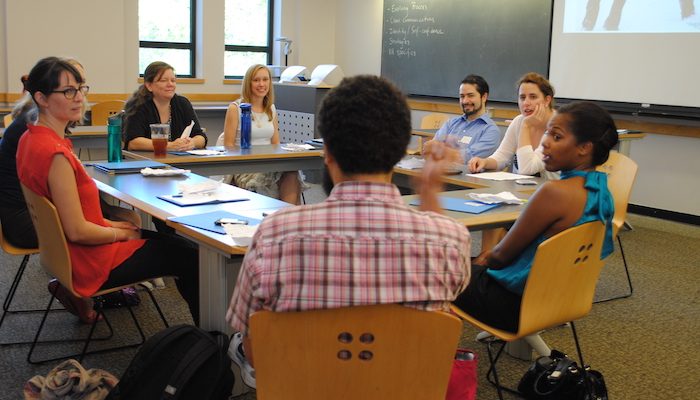
Throughout the course of my Masters’ and PhD, I was Teaching Assistant across five undergraduate modules. Now in my capacity as a Module Leader I recognise and try to act on my responsibility to support and develop the Teaching Assistants (TA) on my modules in the following ways. Often, initial contact occurs the week immediately before teaching begins and can be focused on the practical details of module structure and administration. But as important as these are, I suggest it’s also worthwhile to find out what teaching experience your TA(s) have (both in general and of your particular module or topic) and to understand why they are teaching.
My point here is that the support needs of someone teaching for the first time will be different from someone with extensive experience, but conversely, a more experienced TA is more likely to be in the final stages of their PhD with all the pressures that this entails. In terms of why they are teaching, gaining experience and/or supplementing their income may impact on how much support they are interested in, or additional work they are willing to undertake – such as an Higher Education Academy Fellowship. Having gained some context, your TA probably needs, wants or would appreciate the following:
Remember that whilst you may be the face of your module, you TA will probably be your students’ main point of contact through their seminars, office hours and assessment feedback. As such, make sure they know what key messages you want them to get across in Week 1 regarding module format, content and assessment. Beyond the specifics of the first seminar, depending on their experience they may also appreciate practical classroom tips for overcoming silences or exercise ideas such as icebreakers. The British International Studies Association Post Grad Network teaching blog is a good resource here as is Teaching Politics & International Relations by Gorman et al (2012). Other top TA tips include: suggesting they apply for an inspection copy of the core textbook; ensuring they have access to any online learning environments and other dept. resources; advising them on handling student emails and how to use their office hours.
See if you can get a copy of the TA role descriptor and check whether your dept. pays TAs prep time. If not, then you as the module leader are expected to provide lesson plans regardless of whether you are taking seminars yourself. Even if they are paid, chances are (as we all know from experience) teaching prep will take up more time than TAs are paid for. So, if you can, support them by providing in advance and explaining your lesson plan and any reading notes or class room activities. But don’t just hit send. Ensure they know how much latitude they have to develop or depart from your plans, or whether you expect them delivered as written. What you consider to be a comprehensive plan may be incomprehensible to them, so check their understanding where possible.
Let TAs know what expectations they should have of students in an ideal world, but also what are they are likely to encounter on the day in the room. In addition, what expectations do you have of your TA and what sort of support and contact can they expect from you as the module leader going forwards? Make sure that your intention of giving them autonomy, does not come across as benign neglect! How hands on or light touch do you plan to manage them, what sorts of student queries, emails or admin are they responsible and which will you handle? Generally, my position is that TAs are the main point of contact for our students in terms of seminar admin, content, the readings and assessment feedback, but questions regarding the lectures, module administration and structure should come to me.
Ensure TAs understand how assessment will be run i.e.: what advice and support they could/should be giving to students; what advice you as the module leader will be giving students; how marking, and moderation/second marking will be conducted; what the turnaround time is; and what your expectations are of their feedback in terms of length and format (summative and/or formative). Generally, I try to meet face to face with my TAs at least twice. First, immediately before teaching starts and the second time is during marking, especially if there is a team of TAs teaching and marking.
Last but by no means least, remind them their role as TA is to facilitate student learning through reflection and discussion – they are not expected to know everything about the topic. Providing reassurance can also mean (subject to your other commitments) offering to do peer observations and talking TAs through any mid semester informal feedback.
Further Reading on E-International Relations
- Teaching International Relations as a Liberal Art
- What to Do When You Don’t Like a Topic You Teach?
- Getting the Most Out of Class Discussion
- Let’s Talk: Transformative Leadership and International Relations
- Teaching and Learning Professional Skills Through Simulations
- The Politics of Teaching International Relations in the Arab World: A Critique